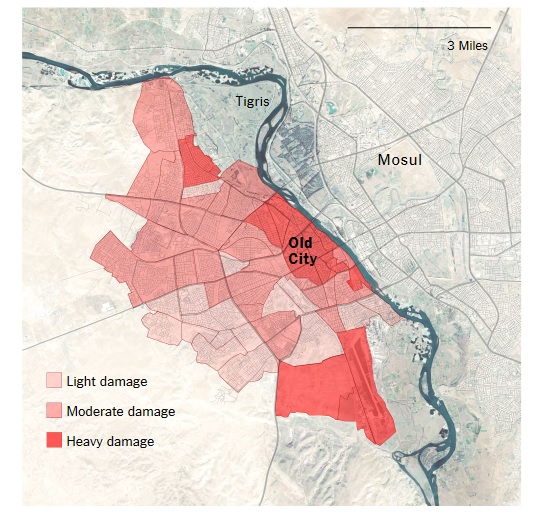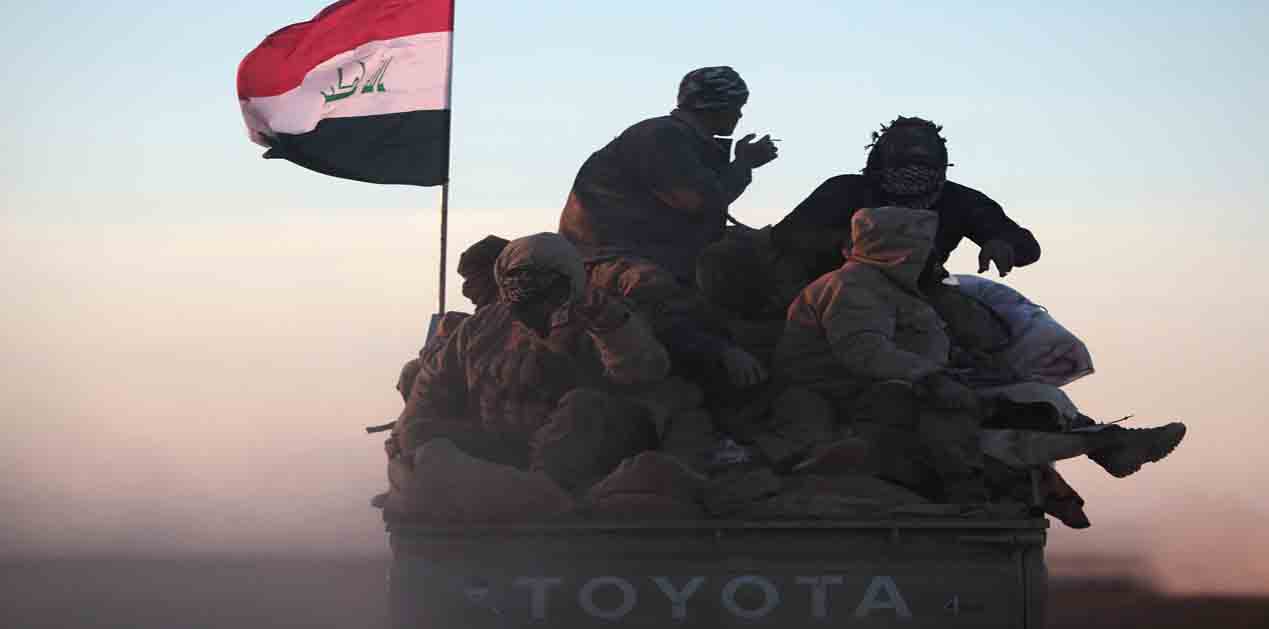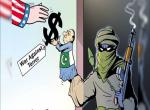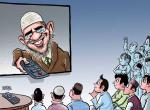Iraqi Prime Minister Announces the Fall of Mosul
July 10, 2017 is rightly being acknowledged as a historic day in the fight against dreaded phenomenon of the Islamic State of Iraq and Syria (ISIS) brand of terrorism. The Iraqi Prime Minister(PM) Haider al-Abadi, on this day, proudly announced the victory of the Iraqi forces, supported by coalition forces, in one of its longest and punishing conventional fight against Daesh (Arango, 2017). The fluttering national flag of Iraq on the bank of River Tigris defined the liberation of the city of Mosul by Iraqi Security Forces (ISF) from the control of militants of Daesh and marked the end of a bloody campaign that lasted nearly for nine months.
It may be recalled that for recapturing of the city of Mosul, counter-Daesh operations were launched by the ISF in October 2016, which saw the massive deployment of nearly 70,000 ISF troops (George, 2017). According to the United Nations (UN) office for the Co-ordination of Human Affairs, the anti-Daesh campaign led to the displacement nearly 9,20,000 civilians, leaving behind the ruins of Iraqi heritage (Report, 2017). The UN has described the recovery of the Iraqi city of Mosul from Daesh control as a “significant step” in the fight against terrorism and violent extremism, and has vowed its support to aid the displaced communities and restore rule of law in the freed areas (Report, 2017).
Recapture of Mosul may not End the Global Threat
The United States (US)-led coalition forces which helped the ISF in anti-Daesh operation has however, warned that recapturing of Mosul does not indicate the end of the global threat of Daesh. Even though Daesh does not hold any more significant territory in Iraq, there are pockets of resistance present in the city along with certain residual threats from Daesh’s sleeper cells which could initiate suicide attacks. Sporadic clashes between Daesh militants and ISF after the victory of Mosul, and continuation of air strikes on remaining Daesh locations support this fact. Despite various tactics used by the Daesh militants which include ‘fishy surrender attempts’, suicide attacks, etc., the ISF has continued its assertive campaign against Daesh in the remaining pockets (ABC News, 2017). It is learnt the ISF is willing to accept only unconditional surrender and that too in small groups to avoid the threat of infiltration by suicide attack groups back in the city.
On July 10, 2017, after the recapture and asserting the regained authority over Mosul, Iraqi aircrafts dropped three million leaflets over the city, showing the map of Mosul in the colors of Iraqi flag with the message “Mosul has been returned to the bosom of Iraq” (Arango, 2017).

(Courtesy – The New York Times - https://www.nytimes.com/interactive/2017/07/11/world/middleeast/what-i-saw-in-mosul-iraq-isis.html)
Significance and Challenges
Mosul is the largest city of Iraq and its capture had given Daesh immense tactical and psychological strength. Prior to Mosul, Daesh was prominently operational in the rural, desert areas west and south of the city of Mosul. After its capture, Daesh made it the center of the so-called ‘Caliphate’ in June 2014 that established ISIS as a force to reckon with. Abu Bakr al-Baghdadi chose Mosul’s 12th century old Grand Al-Noori mosque to declare the establishment of the Caliphate. It is the same city from where Daesh traded oil with its neighboring countries, which helped financethe terror outfit’s activities in the region and well beyond.
After the military victory achieved with the ISF recapturing Mosul, it is expected that the mop-up military campaign will conclude till the end of the year. Nevertheless, the major issue after the military campaign will be whether the government forces can hold the territory together. The factions within the Iraqi society have not disappeared and are still visible. The tense relations between the Kurds and Iraqis in Northern Iraq will once again give traction to the Kurdish aspiration for independence in Iraqi Kurdistan. It is feared that the Kurds, who have been operating an autonomous enclave since the 1990s, are moving to hold a referendum on independence in September 2017, despite US efforts.
While dealing with this, preventing Iran from expanding its influence in Iraqi and Syrian territories will be another serious challenge. This was evident from the strong resistance from Iraqi Sunnis to the Federal set-up in favor of the strong Central Government. Iraq’s constitution provides for decentralisation, but it has yet to be put into effect. Some within the Shia community, goaded on by Iran, will insist on retaining the spoils of majoritarian rule, preserving a dominant Baghdad to lord it over the Sunnis.
If these challenges are not addressed timely, such factions will continue to roil Iraqi politics in the near future and provide space for terror forces like Daesh to re-enter the arena to exploit the unsettled conditions. On the political front, the reconciliation and power sharing with the Sunni-population of Iraq remained a major challenge for the Prime Ministers since the US forces ousted Saddam Hussain in 2003. In Baghdad, Shiite politician Karim al-Nouri warned that defeating Daesh in Mosul did not mean that "terrorism" was finished. He has urged the government to review its policies for dealing with Sunni areas of the country to "avoid previous mistakes that led to the emergence" of the ISIS. A senior member of Badr Organisation further said, “the government needs to work on removing fears of marginalisation and terrorist affiliation in Sunni areas", and appealed to Iraqi security forces to stay in Mosul until it is fully secured, before handing over the area to the local forces (Janassen, 2017).
The Syrian Theat
Outside Iraq, Daesh still holds the city of Raqqa in Syria. The ongoing civil war in Syria is adding complexities to the anti-Daesh campaign in that country. Due to the sectarian policies implemented by the previous regimes, Daesh could establish its hold not only in Iraq but in Syria too. It also helped Daesh which was merely operating in rural parts of Iraq to revive after eradication of Al Qaeda from Iraq. Therefore, establishment of peace in Syria is imperative for lasting peace and stability in Iraq.
Reconstruction and Rehabilitation
Post anti-Daesh operation in Mosul, reconstruction, rehabilitation and stabilisation of Mosul and the rest of the countryis seen as a primary challenge for Iraqi PM Haidar al-Abadi’s administration. There is an urgent need to initiate a resourced effort to stabilise, secure, govern and rebuild the liberated city. Iraq cannot do this alone and substantial international support is indispensable. This will encourage displaced citizens to come back home safely. Till the huge mop up operations conclude, security environment will remain tense, tentative and unpredictable. With Daesh losing Mosul to the Iraqi forces, a massive reconstruction effort is required to rebuild this ancient city. According to estimates, US $100 billion would be required to make the city livable for all its inhabitants. The coalition of 68 countries, led by the US to fight the ISIS, has raised the necessary funds to start that process through the United Nations. A similar plan also exists for Syria (Blinken, 2017).
Conclusions and Indian Perspective
In net assessment, strategic analysts maintain that despite the loss of Mosul, it would be unwise to start writing the final obituary of Daesh as a terror organisation, even if the reports of Baghdadi’s killing eventually get confirmed. Its extreme radical ideology will continue to haunt the Islamic world. Fall of Mosul is indeed a huge set-back for ISIS, not only in the symbolic terms, but also for the morale of its fighters, depletion of resources of men, material and funds, future recruitments, propaganda campaign, etc. However, the fundamental attraction of the Caliphate and the hard line Islamic ideology represented by Daesh, are unlikely to disappear soon. The possibility of the Daesh fighters regrouping in smaller modules in different parts of the Islamic world under regional leaderships and fractured franchise, as had happened with al Qaeda post-Osama bin Laden, cannot be ruled out. The large number of volunteers from the West, particularly the European countries, might not be welcomed in their earlier abodes, since they would be well marked and monitored. Even others may face similar challenges in the Asian countries. Would it be possible for them to sneak into the unsettled parts of Afghanistan and the Af-Pak region- possible, in fact, that is most likely. This should be a cause of concern for India, especially in view of the earlier reports of some groups of Indian sympathisers of Daesh having chosen the Afghan route to join the Iraqi battle grounds.
India is expected to play a major role in rebuilding and reconstruction efforts in Iraq/ Mosul. India has old historical ties with Iraq and is well regarded in that country. It also has a proven track record in peace operations and in reconstruction work. Till the troubles erupted in that country, Iraq was India’s second largest oil supplier. Socio-cultural ties between the two countries have always been robust; though bilateral trade had slowed down considerably since the 2003 US invasion of Iraq. Cooperation continues under the Indian Technical and Economic Cooperation (ITEC) to train Iraqi government officials. The Ambassador of Iraq to India Fakhri H Al-Issa has already talked about the potential for India’s possible role in the reconstruction of Mosul. He recently said, “India can provide training to the armed forces and the police in counter-terrorism, and transfer Indian expertise in governance” (Bhaduri, 2017). While this should be welcomed, such a move should come with an element of caution that the remnants of Daesh might target our personnel and projects, as was experienced in Afghanistan.
References
ABC News. (2017, July 11). Mosul ISIS fighters feigning surrender in order to attempt suicide attacks. ABC News. Retrieved July 12, 2017, from read:http://abcnews.go.com/International/mosul-isis-fighters-feigning-surrender-order-attempt-suicide/story?id=48573098
Arango, T. (2017, July 11). Iraq Celebrates Victory Over ISIS in Mosul, but Risks Remain. The New York Times. Retrieved July 11, 2017, from read:https://www.nytimes.com/2017/07/09/world/middleeast/mosul-isis-liberated.html
Arango, T. (2017, July 10). Iraq Celebrates Victory Over ISIS in Mosul, but Risks Remain. The New York Times. Retrieved July 12, 2017, from read:https://www.nytimes.com/2017/07/10/world/middleeast/iraq-mosul-celebration.html
Bhaduri, A. (2017, July 10). Mosul liberated: India's help needed to rebuild Iraq. Governance Now. Retrieved July 12, 2017, from read:http://www.governancenow.com/news/regular-story/indias-help-needed-to-rebuild-liberated-mosul
Blinken, A. J. (2017, July 09). The Islamic State Is Not Dead Yet. The New York Times. Retrieved July 12, 2017, from read:https://www.nytimes.com/2017/07/09/opinion/islamic-state-mosul-iraq-strategy.html
George, S. (2017, July 10). Iraqi PM Declares 'total victory' against IS in Mosul. Indian express.
Janassen, B. (2017, July 11). Sporadic Clashes in Iraq's Mosul after victory declaration. ABC News. Retrieved July 11, 2017, from http://abcnews.go.com/International/wireStory/sporadic-clashes-iraqs-mosul-victory-declaration-48560483
Report, I. E. (2017, July 11). Recovery of Mosul major step in fight against terrorism: United Nations. The Indian Express. Retrieved July 11, 2017, from read:http://indianexpress.com/article/world/recovery-of-mosul-major-step-in-fight-against-terrorism-united-nations-4745176/
Image Source: http://s.newsweek.com/sites/www.newsweek.com/files/2017/02/23/mosul-offensive.jpg











Post new comment